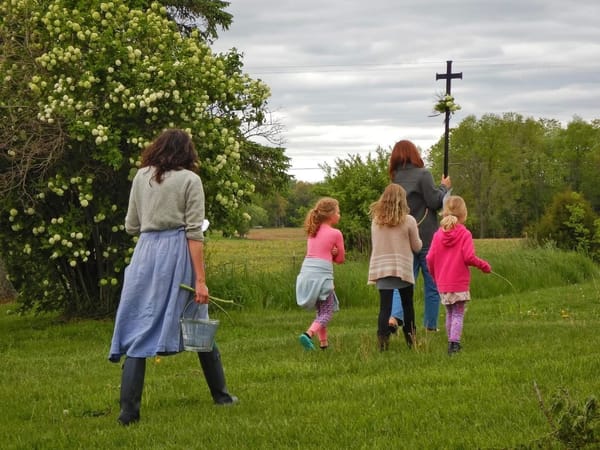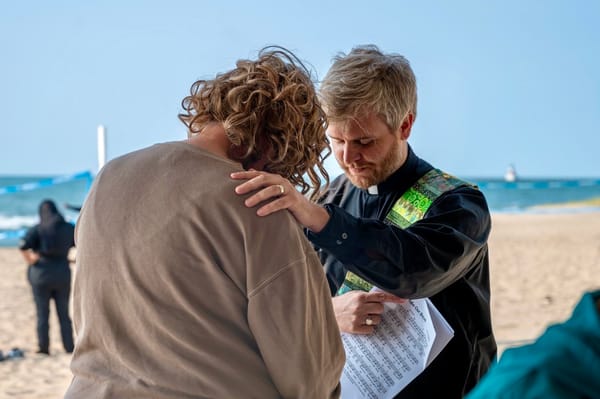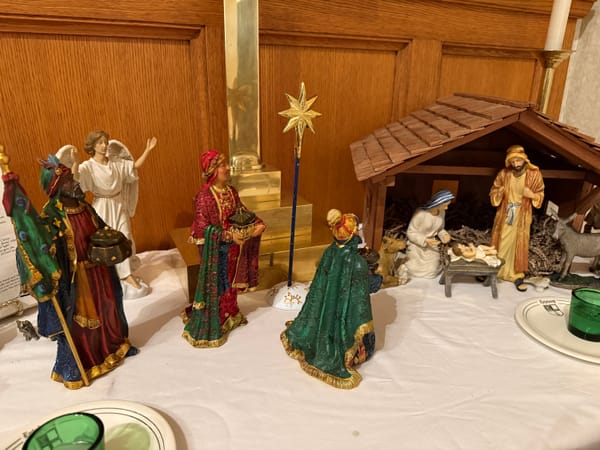A Wee, Little, Wealthy, Unlikely Saint
St. Zacchaeus saw Jesus coming, ran toward him, climbed a tree to see him, and then gave what he could give so that he could walk in the way of love.

Pentecost 21, Year C, Proper 26
Sermon for November 2, 2025, All Saints Sunday
My friends, I speak to you today in the name of one God, Father, Son, and Holy Spirit. Amen. Please be seated.
Good morning, Epiphany. Happy All Saints Sunday, or happy twenty-first Sunday after Pentecost, whatever the case may be for you. Happy day after maybe the best World Series game ever? It was 11 innings of incredible stress for me, thanks. Just nothing like it. Happy Halloween weekend, maybe. That’s what matters the most to the Wakefield children, of course, thanks to all the candy. I’m celebrating “No Sugar November” in response, otherwise I end up eating most of their trick or treat haul.
But in the Episcopal Church, today is both the twenty-first Sunday after Pentecost and All Saints Sunday. We have an option to celebrate the Sunday closest to November 1, which is All Saints Day, as All Saints Sunday... so this year we’re taking half that option, or both options maybe. All Souls Day, which is normally November 2, gets transferred to tomorrow. Does all this make sense? This is the sort of thing you send priests to seminary for, I guess. Today, you’ll get songs and prayers celebrating All Saints Day alongside the scripture readings for the twenty-first Sunday after Pentecost. Don’t worry, it's a bit janky, but it all works.
Last year, I talked about the beauty of All Saints Day, I called this the day “when the church really celebrates its long history of being the church.” Saints are exemplars of the faith, those we can look to and learn from in our own walks with Christ. We collectively lift up saints who have gone before us on this day, from Mother Teresa to Martin Luther King Jr., from Polycarp and Julian of Norwich to Juan de la Cruz and Martin of Tours. We also celebrate our local saints and those who have died in the last year. Joan DeHaven and Nancy Grib both come to mind for me, along with the ten we buried in the memorial garden yesterday. I ask, as your priest, that you pray those names, Joan and Nancy, and the names of any others who have died... pray them aloud during the prayers of the people here in a few minutes. Let’s fill the room with our saints this morning.
This morning, though, I chose not to read the scripture assigned for All Saints Day because I simply could not get past the lectionary readings assigned for the twenty-first Sunday after Pentecost. These are such good passages; some familiar, some a little less so. If you were not listening closely while Marti and Warren read theirs, don’t worry, I’ll weave pieces of the first two in with the gospel this morning, because that’s where I want us to land in the sermon, on the example, the exemplar, of this diminutive tax collector.
Now, Zacchaeus, he is a notable character in the gospel narrative – in the story of Jesus and the disciples found throughout Matthew, Mark, Luke, and John – even though he only appears once, and it’s here, in these ten verses in Luke 19. I grew up singing songs about this tax collector in children’s church, maybe you did too... “Zacchaeus was a wee little man, and a wee little man was he.” Anyone? Maybe one or two of us? Too many Catholics in here, I guess? (Ha.) “He climbed up in a sycamore tree, for the Lord he wanted to see.” Because his story only comes in these ten verses, we only have one time every three years to tell his story, thanks to our lectionary, and so I couldn’t miss it today.
We know very little about this Zacchaeus, but we do have a few descriptive notes. First, he was indeed a “wee little man;” our text describes him as “short in stature.” ...Maybe not the kindest descriptor, but it’s what he’s now famous for, two thousand years later. We also know that Zacchaeus was a pretty big deal, “a chief tax collector,” ἀρχιτελώνης (architelones) in the Greek, and that’s the only time this word is used in the entire Bible. Luke also describes him as rich. We know from other parts of the Lukan text that rich tax collectors are publicly seen as the worst of the sinners, the worst outcasts according to the Pharisees and religious teachers of the law; these are the people most often corrupt, gathering taxes on behalf of the occupying Roman empire and often keeping some for themselves while they do so, becoming wealthy off the backs of the people. No one, no one likes a tax collector. So, imagine this picture of Zacchaeus with me: short, powerful, exceedingly wealthy, friendless, despised. A chief tax collector, outcast of the outcasts.
So, what does Zacchaeus do in his ten verses? Trying to see who Jesus was but unable to see because of the crowds, he is relentless: Zacchaeus runs ahead and climbs a tree to see the Lord. Jesus notices this and calls him down by name, greeting him, recognizing him, and telling him he will stay at his house. (Probably not a bad choice for accommodation, we do know Zacchaeus is rich.) It says the religious among the crowd grumbled about this, but they were likely furious about it: this is a “bad guy,” this is one of those on the other side of the aisle, the battlefield... Zacchaeus is serving the occupying forces, one of those who takes their hard-earned money and directs others to do the same. The religious label him a sinner, and Jesus, well, Jesus pronounces salvation upon him and his house.
On this, All Saints weekend, at the least, I cannot help but think of this wee little man, Zacchaeus, as one of the first saints of the church. I have no idea what this man’s life was about; knowing his wealth and his position, I would be surprised if he later died for the faith, though encountering Jesus in this way on this day might have made him reckless in his devotion. What we do know is that he was passionate and determined enough to climb a tree to see Jesus, and, perhaps most importantly, we know that he pledged to the Son of God that he would give half of his possessions to the poor and try to take incredible care of anyone he had wronged. This was more than an empty promise, more than empty religious offerings or incense. This was a tangible, life-changing, sacrificial pledge from a man who had much, hoping to change the lives of those who had very, very little.
In our Old Testament reading this morning, Isaiah is pronouncing the frustration of God with the people of Israel. This judgment was likely announced during the 8th century BC, during a time of incredible wealth and power for the Jews, and when their spiritual lives and their devotion to God were waning. God is here firmly rejecting their empty religion: “bringing offerings is futile, incense is an abomination to me,” “your new moons and your festivals my soul hates, they have become a burden, I am weary of them,” and my favorite, “I cannot endure solemn assemblies with iniquity.” Then, in this brief passage, God gives them clear directions, which are echoed in the ministry and words of Jesus and in parables this last month: “Seek justice, rescue the oppressed, defend the orphan, plead the case of the widow.” This is true religion, these are the clear priorities of those who love the Lord; they echo throughout the Old and New Testaments, over and over again.
What we see in Zacchaeus is that all are welcome and able to walk in that way of love detailed in Isaiah, even the most outcast of outcasts. All are welcome and invited to walk in God’s favor, in Christ’s footsteps, even those labeled as sinners, and yes, even the rich, though their path may be hardest of all, thanks to the timeless and overpowering allure of money and power, luxury and security. It is always difficult to give to the poor when there’s another toy, another vacation, another nice meal, another house upgrade, another new piece of technology. It is always difficult to give when we feel we earned what we have, and others didn’t; why should anyone else have what I worked hard for?
Well, friends, the answer to that is found in Isaiah, in Luke, and in the words and life of Jesus. Everything, everything belongs to God; we are merely stewards of what we have. And our call, as Christians, as the body of Christ, it is always to seek justice, rescue the oppressed, defend the orphan, plead the case of the widow, to love. It is our call to see Zaccheaus, laying down his riches and his power, desperately climbing a tree, making a fool of himself, just for a sight of Jesus... it is our call to see Zacchaeus and live likewise.
The passage from 2 Thessalonians is where I want to end this morning. Paul and his buddies are writing to another church after Jesus’s ascension, another group of persecuted followers of Christ, encouraging them to stand firm in their faith. After Pastor Bob’s sermon last week, rightly urging us here at Epiphany not to be self-righteous, and after a Diocesan Convention when our church received a surprising amount of praise and attention, I could not help but see Epiphany in these verses. “We must always give thanks to God for you,” Paul says, “because your faith is growing abundantly, and the love of every one of you for one another is increasing.” Here we have a church that is growing, that is increasing our efforts in the community, that is bountiful and abundant at brunch and in fellowship and in donations and in so many ways. We have a church pointing us toward God. Paul is praying here for such a community. He prays like this: “To this end we always pray for you, asking that our God will make you worthy of his call and will fulfill by his power every good resolve and work of faith, so that the name of our Lord Jesus may be glorified in you, and you in him...” ... Asking that our God will make you worthy of his call and will fulfill by his power every good resolve and work of faith.
Friends, we do not do this on our own, we do not do the good work of the faith alone, we do not seek justice and rescue the oppressed and defend the orphan and plead the case of the widow alone. We do this together, we do this in community, and we do it with God making us worthy and fulfilling by his power our resolve and our work. God is the one empowering us to walk in this way of love. God was the one empowering Zacchaeus to boldly give half of his possessions to the poor. And God is the one empowering Epiphany as a community of faith today. We need merely to join God fully in this very good work.
St. Zacchaeus, as I’m going to call him on All Saints Sunday, our wee little, wealthy, outcast, despised, and unlikely saint... St. Zacchaeus saw Jesus coming, he ran toward him, he climbed a tree to see him, and then he gave what he could give so that he could freely walk in the way of love, empowered by God to do so. This morning, I pray that all of us here have that same passion to see Jesus, that same desire to give of our riches and to help the poor, and that we continue to find ways to walk in the way of love, together.
Amen.




